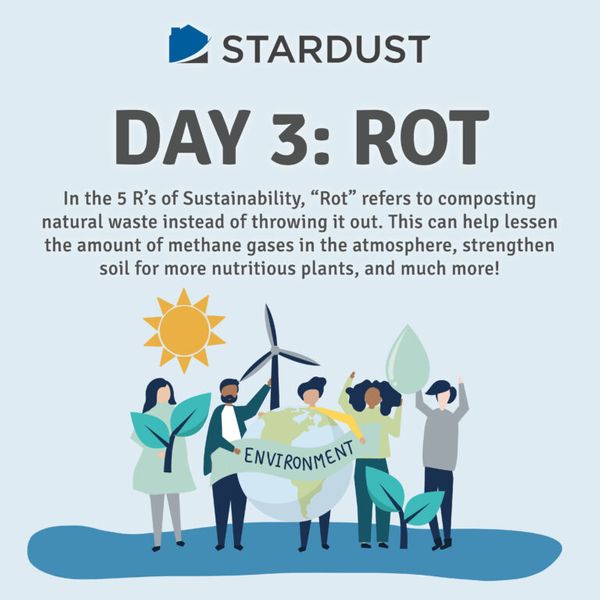Are you interested in learning more about what it means to be “green” or “eco-conscious”? All this week, we will be sharing information about the “5 R’s of Sustainability”, how to be more eco-friendly, and Stardust’s role in the community.
Have you heard of the 5 R’s of Sustainability? If not, here’s a little history on them: Originally conceived of in 1970, the same year that Earth Day was first introduced in America, the 3 R’s (as it was back then) consisted of “Reduce”, “Recycle,” and “Reuse”. As time went on, these basic tenets were added to, so nowadays the 5 R’s are made up of “Refuse”, “Reduce”, “Rot”, “Recycle”, and “Reuse”. (You may see other versions including “Repair”, “Repurpose”, or “Reclaim”.)
The third R in the series, which we will talk about today, will be: “ROT”.
About Rot
In this context, “Rot” refers to composting natural waste instead of throwing it out. Don’t know what composting is? No worries, we’ve got you covered: “Composting” is the process of turning leftover organic matter into compost, which is a nutrient-rich soil perfect for plants, through a natural, aerated breakdown. Compost is usually made up of waste that breaks down easily, including fruit & vegetable scraps, coffee grounds, and eggshells (never use grease, meat, cheese, or any other animal product in composting). Compost can help nourish just about any kind of plant, from grass and flowers, to trees, to food grown in gardens or greenhouses.
Composting also has a lot of benefits for the environment, including:
- Less pollution: composting prevents organic matter from entering our landfills where it will rot and emit harmful gases such as methane, which affects our atmosphere
- Better soil: composting can help give soil nutrients it does not naturally have, which will help keep it more balanced and usable for future generations
- Saving resources: by keeping composting materials out of the landfill, we are using less communal resources like fuel and water
Changes You Can Make
As you can see, composting is quite easy to start and beneficial for everyone involved! If you’re ready to make some changes and start “rotting”, here are some places to start:
- Identify your ingredients: try saving your scraps for a few days, and see what you could easily start composting. Fruit & vegetable scraps, coffee grounds, eggshells, and paper products are some of the easiest to start with
- Personalize your recipe: do you have indoor plants, or outdoor? Are they in pots, planters, beds, or in-ground? Your answers to these questions could make the kind of compost you need very different from the compost someone else is using
- Learn a little chemistry: while the process of composting is quite hands-off and easy, familiarizing yourself with the chemical breakdown that is happening will save you lots of beginner mistakes
How Is Stardust “Rotting”?
So, how does Stardust fit into all of this? While our focus is on reuse (another of the 5 R’s!), we do support other efforts in our community. One of the main ways we encourage folks to “rot” is by promoting local environmental programs, such as ASU’s residential composting program. Together, we can help #StarveTheLandfill.
Want to learn more? Check out these resources:

